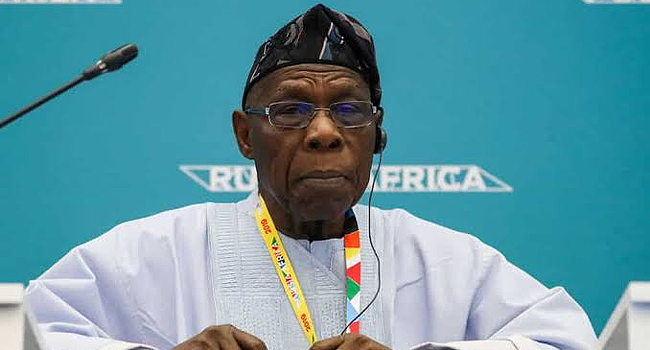President Olusegun Obasanjo has expressed concern about the restiveness among youths due to unemployment, warning that Nigeria may be sitting on a “keg of gunpowder.”
Obasanjo shared his views in an interview with the Financial Times, which was monitored by Channels Television.
“Our youth are restive. And they are restive because they have no skill. They have no empowerment. They have no employment. We are all sitting on a keg of gunpowder. And my prayer is that we will do the right thing before it’s too late,” he warned.
The elder statesman’s comments follow the ongoing #EndBadGovernance protests by youths across Nigeria, which have been driven by issues of hunger and hardship.
Since August 1, youths nationwide have engaged in protests that have escalated, leading to reports of violence and looting across the country.
Obasanjo also noted that Nigeria’s economy would have been significantly stronger had it not been solely dependent on crude oil production.
He termed the country’s reliance on oil as a “deadly mistake.”
“I believe we made a deadly mistake by putting all our eggs in one basket by relying on oil. We had a very important commodity, gas, but we were flaring it,” he said.
the failure of the Nigerian National Petroleum Company Limited (NNPCL), the International Oil Companies, and other national oil companies to ramp up oil production to meet the country’s needs.
Obasanjo said Nigeria could have invested more in Agriculture as against crude oil.
“We ignored Agriculture which could have been the centrepiece of our investment.”
The former president then touched on the reason that Nigeria’s four refineries have remained moribund despite huge investments and attempts at revamping them.
He recalled how he persuaded Shell to run the country’s refineries but the International Oil Company refused, saying there was too much corruption in the sector.
“When I was president, I invited shell to come and take equity and run our refineries for us. They refused and said our refineries were not well maintained. We brought amateurs instead of professionals. Then there was too much corruption with the way our refineries were maintained. They didn’t want to get involved in such a mess,’ he said.
He condemned the government’s disposition towards getting the refineries back on their feet.
“How many times have they told us that the refineries would be fixed, and at what price? Those problems as far as the government refineries are concerned have never gone. They have even increased. And if you have such problems, and the problems have not been removed, then, it means we are not going anywhere.”
He said that those benefiting from the lucrative business of fuel importation are going to make efforts to frustrate the Dangote Petroleum Refinery.
Obasanjo stated this in the wake of allegations by the President of the Dangote Group, Alhaji Aliko Dangote, that some ‘mafias’ were making efforts to frustrate the $20bn refinery.
“Aliko’s investment in a refinery, if it goes well, should encourage both Nigerians and non-Nigerians to invest in Nigeria.
“If those who are selling or supplying refined products for Nigeria feel that they will lose the lucrative opportunity, they will also make every effort to get him frustrated,” Obasanjo stated.
Officials from the Dangote Group have recently expressed frustration, alleging that international oil companies are hindering their refinery operations by either refusing to sell crude or charging a premium of up to $4 above the usual price.
They also accused the Nigerian Midstream and Downstream Regulatory Authority (NMDPRA) of intentionally issuing licenses to importers of substandard fuel.
In response, the NMDPRA denied these allegations, asserting that Dangote diesel is of lower quality compared to imported alternatives.
NMDPRA Chief Executive Farouk Ahmed added that the country would continue fuel imports to prevent a monopoly by the Dangote Group.
Additionally, former President Olusegun Obasanjo criticized President Bola Tinubu’s approach to removing fuel subsidies, suggesting that the administration should have first addressed the potential hardships caused by subsidy removal and sought ways to mitigate its impact.
“There’s a lot of work that needs to be done. Not just wake up one morning and say you removed the subsidy. Because of inflation, the subsidy that we have removed is not gone. It has come back,” the former President stressed.
He said there must be investor confidence in Nigeria, adding, “You have to go from transactional economy to transformational economy.”



